Exeter City - the other St James Park
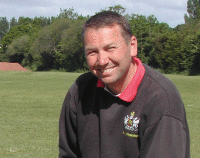
Stadium Manager and Head Groundsman, Clive Pring, explains how he operates such a tight ship, in keeping with the club's financial controls
Clive Pring has a lot to thank Nigel Mansell for. Well, perhaps not Nigel himself, but his decision to buy a golf course at Woodbury Park in Devon, for it was here that he began his career in turfcare. "My friend, Ian Chenery, who is now Course Manager at Woodbury Park, asked in the pub one night if anyone fancied a job as a greenkeeper. After giving it some thought - about one pint - and being bored of my delivery job I went for an interview and I've never looked back."
Clive continues; "I left the golf industry after about seven years to become Head of Grounds at a local private school. This introduced me to many different sports, including the wonderful world of cricket. It's from here I was approached by the football club to become their Head Groundsman. Apparently, my name was put forward by Ian when he had been approached by one of the directors. He has a lot to answer for!"
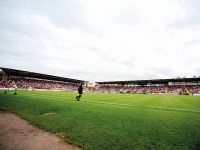
"Whilst at Woodbury Park, I was lucky to be given the chance to complete an HNC in Golf Course Management at Cannington College in Somerset. While there have definitely been people who have influenced my career path and my management style, Ian being one of them, I have been inspired and stimulated by learning and understanding the science side of our job, which is sometimes ignored," states Clive. "I never do anything just for the sake of it and always look to understand what the grass plant needs."
As an example, Clive says that, whilst presentation is important, it doesn't rank as his first priority. This statement may seem at odds with an industry that prides itself on the quality of its pitches, but he goes on to explain; "My first priority is root depth, without which you get an unstable surface. If everything you can't see is healthy, then everything you can see will naturally look great without too much effort.
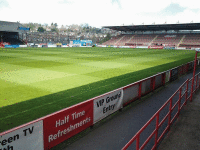
Clive is supported by three full time staff. Charlie Woolnough is Deputy Estates Manager. "He was in the golf industry as a course manager and joined about two years ago when I took on the stadium manager's duties. He's very dynamic; no job's too big and he's a great team player."
"Dave Richards (Big Dave) is part of the furniture. He's been with the club for about twelve years." Why 'Big Dave'? "Because he's 6' 7" tall and built like a brick ..... !"
"Joe Southcott joined us nearly four years ago from Cannington College, where he had been studying since leaving school. He is in a great position to learn all the knowledge Charlie and I have acquired over the years."
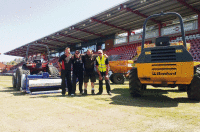
"And there's the Colonel - Ken Sanders. He gives an outstanding amount of time, helping out on the pitch on matchdays and with numerous maintenance projects around the stadium and training ground. Also Kevin Burne, Exeter University's head groundsman [featured in issue 50] volunteers for match day pitch work."
"Then there is Dennis, John, Chris, Alan, Ian, Jon and Eric, all volunteers who give up a bit of their time each week to fix and mend for me."
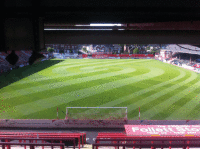
"There is also a very large party of fans who walk the stands after every game picking up the rubbish, for which we are truly grateful as this allows us to concentrate on the more important parts of the job."
It is clear that there is enormous loyalty within and for the club, perhaps because it is owned by the fans. It has known difficult times in recent years, including a spell in the Football Conference, but a return to Football League status in season 2008-9 has seen better days return. At the time of writing, the club were sitting mid-table, six points ahead of west country rivals Torquay and four behind Plymouth.
Clive joined the club whilst they were still in the Football Conference and was instantly aware that he would not have the budget he might like. But, his promotion, or should that be 'inclusion', two years ago, to the role of Stadium Manager, now means that he controls the budgets for both the grounds and the stadium.
"I formulate both, which then go to the board and accounts to be given the rubber stamp (or not, as is often the case) and then manage both during the year to make sure we don't overspend," he explains.
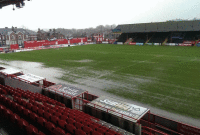
"These fine sands do compact very easily and reduce pore spaces within the profile, so we need to aerate often; usually fortnightly. Our drainage lines can easily become obstructed by the finer sands from our soil if they aren't regularly kept open at the surface. Budget permitting, we like to dress little and often and we have some sprung tine harrows, which are extreme, but effective, and used regularly."
On such a tight and well controlled budget, it is unlikely that Clive will ever enjoy the benefits of undersoil heating or grow lights, but is benefitting from a soil bypass drainage system installed four years ago; main drains at 3.5m centres and sand slits at 1m apart. "We only have a small 110mm output, so there is a limit to the speed at which it will drain," he explains. "But, we have only been caught out when we experience rain of biblical proportions which, to date, has happened twice this year. We also have frost covers."
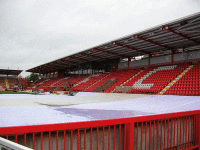
The diligence of Clive and his team has rewarded the players with one of the better playing surfaces in the lower leagues, and this is due to the maintenance and renovation procedures in place. "As mentioned earlier, we aerate regularly. We have our own Charterhouse Verti-Drain and a Sisis slitter, and we also hire in an Imants Shockwave from Devon Garden Machinery (DGM). I like to vary types and depths."
"The pitches are cut at 25mm as our manager wants to play a passing game. This is done using a Toro 2000D or Honda rotaries in the stadium and a John Deere 3235B at the training ground, where we are responsible for a 5.5 hectare site."
"We fertilise about every three or four weeks, alternating between granular and folia as it leaches fairly quickly. I buy mainly in bulk, and usually as cheap as I can get something that suits." Those budgets again.
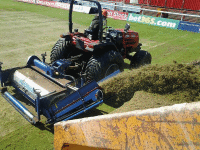
"I like to give all staff every opportunity to prove they are competent enough to undertake all tasks, although I still mark out the stadium before each game. That way, if there is a bit of a wobble, I can only blame myself," he confirms with a smile.
End of season renovations are carried out in-house. "We have to be very shrewd, resourceful and manage our budget carefully. Doing everything in-house reduces the cost significantly. "
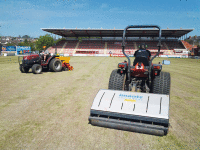
"I suppose our biggest concern is the possibility of play-off involvement, which would be fantastic for the club, but which would determine the start date of our renovations. The difference could be almost a month's delay," he reckons. "We are also a club that relies heavily on income from pre-season fixtures with higher division teams. These are generally played from mid-July, which may only give us a six week window to carry out renovations. Fortunately, we don't have have any concerts scheduled at the moment."
"We are always looking to invest in our pitches, if money becomes available, but this is usually only when we sell one of our younger players.
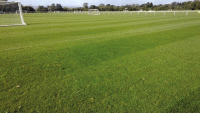
With that level of additional expense, much of it out of the control of the club, Clive knows only too well, how important it is for him to run a tight ship. "As stadium manager, I also have to consider such things as match day security. We have a match day safety officer and a Safety Advisory Group, with representatives from the local council, property services, fire officers and the police, who meet regularly to make sure we comply with the sports grounds licensing authorities green guide. This is something all football clubs have to do."
And then there's all the current legislation to keep on top of; "which is probably changing as you read this!" states Clive.
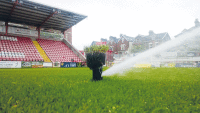
"Foxes and rabbits are a pain at the training ground, and we have a cat who uses a goalmouth as a litter tray in the stadium! My deputy walks his bull terriers around the perimeter every morning and this tends to keep the foxes out of the stadium, but not the cat!"
Clive has a decent array of machinery at his disposal (see 'what's in the shed?' panel), but is always looking to push to the next level. "You can have the best machines on the market, but without operators they are useless," he states. "The last thing I can afford to do is buy equipment that rarely gets used. For example, I would love a couple of walk behind cylinder mowers for the stadium, but would also require extra staff or more hours in the day to be able to use them. My team are busy enough with what we have to accomplish already and, in the current economic climate, I'm just delighted that I have not had to let anyone go."
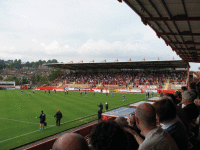
Clive goes on to observe, quite rightly, that the lack of money and the economy has tightened purse strings for everyone. "Greenkeepers and groundsmen at all levels are still producing some wonderful surfaces as they don't want their standards to drop," he suggests. "Where we have suffered the most is the actual working environment we are in every day and the stretching of other areas, such as machinery upkeep and PPE purchases, which could have serious knock on effects for the future. We already look after our own machinery between us, so that's one area we are making savings."
"All we can do, as an industry, is continue with the good work, striving to improve every year. Eventually, the penny will drop with employers, but I must state that we certainly don't feel undervalued here at Exeter."
Wearing two hats appears to be a challenge that Clive has risen to with ease and he concludes by saying: "We held a demo day at our club last year, which proved successful. I want to help local groundsmen as much as I can and, to that end, I am also Pitch Inspector and Adviser for the Devon FA."
Fair play.
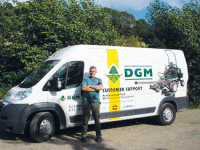
Toro 2000D
John Deere 3235B
Tym T430 tractor with front loader
Kubota L3200 tractor
Honda pedestrian rotary mowers x 4
Cushman Turf Trucksters (old 3 wheelers) x 2
Hardi 300ltr sprayer
Cushman top dresser
8ft single line brush
6ft Sisis zig zag brush
Pattinson tractor mounted scarifier
Sisis leaf sweeper
Sisis Multislit
Spray linemarkers x 2
Tractor mounted sprung tine harrows
Water ballast roller
Various strimmers and blowers
